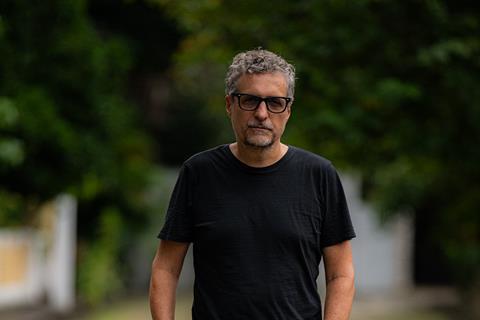
Kleber Mendonca Filho likes to expose the inequalities and contradictions of Brazilian society through specific situations — for instance, the building on the verge of demolition in Aquarius (2016), his debut in Cannes Competition, or the village that disappears from the map in Bacurau, winner of the jury prize in 2019.
Set in 1977, The Secret Agent — his third Palme d’Or contender — offers an everyday perspective of life under a dictatorship, where violence is almost invisible. It tracks the journey of a mysterious tech guy (Wagner Moura) who seeks a second chance at life in the coastal city of Recife, Filho’s hometown and the setting for most of his films.
The co-production between Brazil (CinemaScopio), France (MK Productions), the Netherlands (Lemming) and Germany (One Two Films) shot from June to August last year in Sao Paulo, Brasilia and Recife; mk2 Films handles international sales. At $4.7m, it is Filho’s biggest-budget project to date, with support coming from Brazil’s leading federal backer, the Audiovisual Sector Fund.
The film’s title resonates strongly in the collective imagination, particularly with mainstream cinema. Was that intentional?
I hadn’t thought of it that way. I chose it because it’s mysterious, exciting and sexy, which makes sense after you see the film. But I promise there won’t be any new gadgets introduced.
It’s also unexpected since secret agents aren’t generally associated with Brazil.
From the point of view of cultural and entertainment production, no. But in Brazil there’s a lot of mystery, intrigue and people who play various roles. All the raw material for the story I wrote is extremely Brazilian. No imported elements.

What made you want to explore this period in Brazil’s history?
I wanted to do a historical investigation of the country, since cinema, especially the commercial kind, often looks at the past through the lens of the present. Brazil 50 years ago had a certain harshness, bigger than what we still have. It had been almost 90 years since the abolition of slavery and 13 years since the coup d’état. Before globalisation, clothes and cars were all made in the country. The colours, the customs and the language were different.
I’m Still Here is still fresh in people’s minds as the most recent international feature Oscar winner. Is there a dialogue between Walter Salles’ film and your own?
When I first mentioned that the film was set in the 1970s, the association with the dictatorship was immediate, especially in Brazil. But I didn’t want to make a film about the dictatorship, although I respect films like I’m Still Here, Go Ahead, Brazil! [1982] and Argentinian production The Official Story [1985].
The exercise I’m doing here is precisely to avoid elements of the films about dictatorship, even though I’m in that universe and within the logic of that moment.
What do you avoid?
The 1970s don’t make me think necessarily about the ‘pau de arara’ [a physical torture technique used by the military in Brazil that originated in Auschwitz]. I also don’t think about the bank robberies, which helped finance the resistance at the time. That’s been done in other movies.
Is it an atmosphere of disguised dictatorship, since much of the population didn’t know what was really happening?
Since I am 56, these are my childhood memories. Back then, wearing a uniform was considered sexy, although that became outdated. Children were forced to march in the streets on Brazilian Independence Day. As children, we also noticed that adults would often start whispering in the middle of conversations, to protect us. What we saw on TV was also relevant, including soap operas [which were required to present a spirit of national wellbeing as preached by the regime]. All to better understand that very particular Brazil.
Once again, you filmed in Recife.
Recife is very inspiring to me. I would like to film in France or the US if I could find the right script. I couldn’t spend two or three years working on something I didn’t believe in. My films need to be happy experiences, as was the case with The Secret Agent, even though it’s a bigger production.
How was it filming with your biggest budget so far?
All my films were the right size for the resources we had. I never felt like I was in a straitjacket; they even looked like they cost more on screen. Bacurau cost $1.4m (brl8m) but it looked like we had spent $2.6m (brl15m). Even though I haven’t suffered before, The Secret Agent is indeed the first film we made more comfortably.

























No comments yet